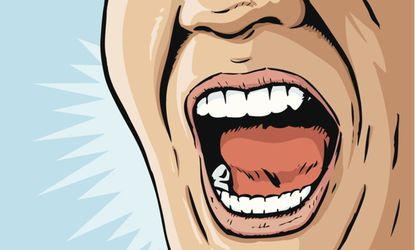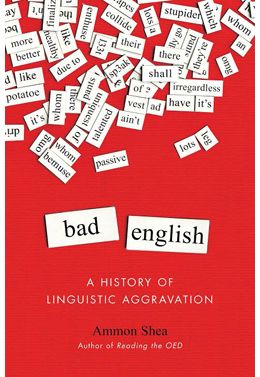A brief history of linguistic aggravation
Words change their meanings all the time, and that infuriates the language scolds

ALMOST ALL WORDS change their meanings. This is one of the aspects of language that is firmly established. It ought to be evident to all of us that words will take on new meanings, as we generally find it confusing to read writing that is more than a few hundred years old: Many of the words carry a different significance than we give to them today.
Even the most dogmatic language purist accepts this concept. They may wistfully look back on some long-ago time as being the Edenic period of our language, but they will not attempt to start a conversation in Chaucerian verse as they know no one would understand them. Yet accepting that semantic drift occurs and liking it are not the same thing.
You will rarely, if ever, hear someone extolling the beauty of a word that has recently taken on some delicate new shade of meaning; it is far more likely that you will hear them complain that the word is losing its specificity or losing its meaning altogether. However, it is frequently the case that the meaning being defended is not actually the original meaning of the word in question, merely the one that is preferred by the person doing the defending.
Subscribe to The Week
Escape your echo chamber. Get the facts behind the news, plus analysis from multiple perspectives.

Sign up for The Week's Free Newsletters
From our morning news briefing to a weekly Good News Newsletter, get the best of The Week delivered directly to your inbox.
From our morning news briefing to a weekly Good News Newsletter, get the best of The Week delivered directly to your inbox.
IN APRIL 2012, the Associated Press announced, "We now support the modern usage of hopefully," which, in certain circles, was tantamount to saying "We now support beating baby seals to death with a copy of Webster's Third New International Dictionary." The fact that they made this announcement by tweeting it served only to increase the ire of those who have long defended us from this onslaught against permissive semantic drift in our adverbs. The Washington Post fulminated, "The barbarians have done it, finally infiltrated a remaining bastion of order in a linguistic wasteland."
What is this "modern usage" of hopefully that the AP referred to? In a nutshell, it is the word when used to indicate "it is to be hoped" or "I hope that," as opposed to the older sense, which is "in a hopeful manner." The ire expressed by The Washington Post is not an uncommon reaction to the expanded meaning of hopefully; few words in the 20th century have had the power to so irritate people.
The 1975 Harper's Dictionary of Contemporary Usage gave a number of distinguished writers, academics, and public figures a list of words and phrases and asked them to comment on whether they found them acceptable or not. Hopefully, when used in the phrase "Hopefully, the war will soon be ended," elicited exactly the kind of sober and nonjudgmental responses that one expects from people opining on language use.
Phyllis McGinley, the Pulitzer Prize–winning poet, replied, "'Hopefully' so used is an abomination and its adherents should be lynched." T. Harry Williams, the famed biographer, wrote that it was "the most horrible usage of our time." Hal Borland, an author and journalist for The New York Times, said, "I have fought this for some years, will fight it until I die. It is barbaric, illiterate, offensive, damnable, and inexcusable."
Sign up for Today's Best Articles in your inbox
A free daily email with the biggest news stories of the day – and the best features from TheWeek.com
There was a widespread opinion among these pundits that the "it is to be hoped" use of hopefully was recent. As is so often the case, the practice that was being prescribed against happened to be considerably older than supposed. It was not a creation of the 19th or even the 18th century. Hopefully reared its ugly head in the middle of the 17th century, in a translation of Montaigne's essays, printed in London in 1648.
Why does hopefully, used in this nonstandard fashion, rub so many the wrong way? There have been a range of arguments made against it. Some critics claim that this use of hopefully is incorrect because it is an adverb and adverbs should modify a verb, rather than a whole sentence. This argument has a certain kind of logic on its side, provided that the person doing the arguing is prepared to ignore that there are a large number of sentence-modifying adverbs that have been used in English for many hundreds of years.
The word surely often functions in much the same way that the disputed form of hopefully does. If one writes "Surely you are joking" the intended meaning is not "you are telling a joke in a manner that is sure." This use of surely, used to qualify a statement rather than a verb, has been in use since the late 14th century. Truly, in the sense of emphasizing a statement ("Truly, I had no idea she was your mother"), has a similar lineage, appearing in English with regularity since the late 13th century.

AMONG PEOPLE WHO might be described as having at least a passing regard for the English language, there are few instances of usage that evoke a desire to mutilate more than the perceived misuse of literally. Whether the listeners/readers literally desire to mutilate those who misuse this word or whether they are literally hopping mad, I cannot say, but it does seem as though this particular instance of semantic broadening leaves many people feeling particularly peevish. More so than almost any other word, literally has become the shibboleth that people who "care about language" wave about to show just how much they care. Such emotion in linguistic guardianship deserves closer regard.
The issue here is that some people (we might call them the Figurativists) use the word literally as an intensifier or in a figurative sense ("I literally vomited up my soul when you said that"), while others think that they should not do this ("No, you did not — souls cannot be vomited"). In fact, the second group of people (we may call them the Literalists) feel quite strongly about the matter: Many of them believe that such misuse of this word brands one as an imbecile and so lacking in couth as to be below pity. The Literalists are of the opinion that literally should never be used in place of figuratively. It should apparently never be used at all, unless, of course, one means to say that something happened in an extremely literal fashion.
One problem is that speakers of English, including some of our most celebrated authors, have been seduced into joining the ranks of the Figurativists (perhaps thanks to loose morals and a healthy supply of good whiskey).
When Vladimir Nabokov wrote, "And with his eyes he literally scoured the corners of the cell" in Invitation to a Beheading, he obviously did not mean that the protagonist had removed his eyes from his head and used them to feverishly scrub the walls. Similarly, in the scene from Tom Sawyer in which Tom has bamboozled several neighborhood boys into performing the task of whitewashing the fence, and received in return many fine treasures, we are given no indication that he was actually performing the action of rolling when Twain writes, "Tom was literally rolling in wealth."
If you count yourself among the Literalists, the bad news is that this particular usage is unlikely to go away anytime soon. It has been used this way for about 250 years, and appears to be increasing in frequency. But English is a flexible language, and it generally is clear what people mean when they use literally, based on the context in which it is used. So the good news is that you will be able to understand what is being said, while at the same time basking in the warm glow of believing that the person with whom you are speaking has just literally (or figuratively, if you prefer) put their foot in their mouth.
THE ARGUMENT AGAINST using unique in any sort of a comparative fashion would seem, on its face, to be a sound one. After all, the inherent quality of unique is that it designates a singular thing or quality — saying that something is more unique is akin to saying that it is most best. Unique being manhandled in this comparative sense sticks in the craw of many, and once you start paying attention to this use you are likely to begin seeing (and hearing) it everywhere.
The word began to be used in English at the middle of the 16th century, adopted from French. It came to the French from the Latin word unicus, meaning "single of its kind." The first sense in which it was used in English was to denote "something of which there is only one," the sense that many people wish it had kept. It remained semantically pure for some time, and little used. Until the 19th century it was still largely considered to be a foreign interloper (the lexicographer Henry Todd referred to it as "an affected and useless term of modern times" in 1818). But when it began to be more widely adopted by writers, later in the 19th century, unique acquired the disagreeable habit of so many words that enter into common parlance: It began to broaden its meaning.
Although this debasement of unique continued throughout the 19th century, language watchers did not appear to pay much attention to it until the beginning of the 20th century. When they did sit up and take notice, there was widespread condemnation of this use, condemnation that continues to this day. In 1906, the Fowler brothers, writing in The King's English, laid down what seemed to be a very simple rule: "A thing is unique, or not unique; there are no degrees of uniqueness."
But the modified use of this word is exceedingly common. Evidence of this use may be found in modern dictionaries, all of which give a broadened meaning for unique in addition to the "singular" one.
The New Oxford American Dictionary gives a definition of "particularly remarkable, special, or unusual." The most recent edition of Merriam-Webster's Collegiate Dictionary defines it as "unusual," in addition to the traditional meanings. The American Heritage Dictionary informs us that one of the word's meanings is "remarkable; extraordinary."
These dictionaries are not staffed with permissive slackers; such books are compiled by exceptionally learned people who spend a good deal of time looking at the English language and trying to create a written record that accurately reflects its use. If there is sufficient evidence that people are using a word in a certain manner, the dictionaries will take note of it and describe this usage. This is not to say that they will just write down any form of usage that is in vogue or overheard in the lunchroom; the words must have shown a prolonged use among what is generally considered to be the educated population.
If you would like guidance in the regard of how you should use unique, Kingsley Amis had some wise, albeit pessimistic words on the matter. He wrote that the habit of using it to simply mean "unusual" "is so notorious among the almost-literate that, like the split infinitive, anything reminiscent of it is best avoided." While Amis allowed that some grades of unique might well make sense (such as "rather unique"), "I would not advise anybody to use it who fancies a quiet life."
Reprinted from Bad English by Ammon Shea by arrangement with Perigee, a member of Penguin Group (USA) LLC, a Penguin Random House Company, ©2014 by Ammon Shea.
Create an account with the same email registered to your subscription to unlock access.
-
 Ukraine using covert US long-range missiles
Ukraine using covert US long-range missilesSpeed Read The weapons are part of a $1 billion Ukraine aid package
By Justin Klawans, The Week US Published
-
 Arizona grand jury indicts 18 in Trump fake elector plot
Arizona grand jury indicts 18 in Trump fake elector plotSpeed Read The state charged Mark Meadows, Rudy Giuliani and other Trump allies in 2020 election interference case
By Peter Weber, The Week US Published
-
 Antony Gormley's Time Horizon – a 'judgmental army' of 100 cast-iron men
Antony Gormley's Time Horizon – a 'judgmental army' of 100 cast-iron menThe Week Recommends Sculptures are 'everymen questioning the privilege of their surroundings' at the Norfolk stately home
By Adrienne Wyper, The Week UK Published